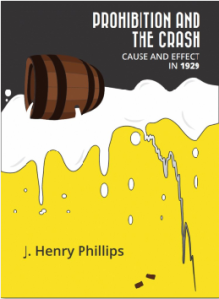Volstead Act Collapse, II-34
 |
| Why did Germany Crash before mid-1927? |
SEC. 34. All records and reports kept or filed under the provisions of this Act shall be subject to inspection at any reasonable hour by the commissioner or any of his agents or by any public prosecutor or by any person designated by him, or by any peace officer in the State where the record is kept, and copies of such records and reports duly certified by the person with whom kept or filed may be introduced in evidence with like effect as the originals thereof, and verified copies of such records shall be furnished to the commissioner when called for.
SEC. 35. All provisions of law that are inconsistent with this Act are repealed only to the extent of such inconsistency and the regulations herein provided for the manufacture or traffic in intoxicating liquor shall be construed as in addition to existing laws. This Act shall not relieve anyone from paying any taxes or other charges imposed upon the manufacture or traffic in such liquor. No liquor revenue stamps or tax receipts for any illegal manufacture or sale shall be issued in advance, but upon evidence of such illegal manufacture or sale a tax shall be assessed against, and collected from, the person responsible for such illegal manufacture or sale in double the amount now provided by law, with an additional penalty of $500 on retail dealers and $1,000 on manufacturers. The payment of such tax or penalty shall give no right to engage in the manufacture or sale of such liquor, or relieve anyone from criminal liability, nor shall this Act relieve any person from any liability, civil or criminal, heretofore or hereafter incurred under existing laws.
The commissioner, with the approval of the Secretary of the Treasury, may compromise any civil cause arising under this title before bringing action in court; and with the approval of the Attorney General he may compromise any such cause after action thereon has been commenced.
***
Section 34 ran counter to Bill of Rights Amendment 4: The right of the people to be secure in their persons, houses, papers, and effects, against unreasonable searches and seizures, shall not be violated... It clearly invited minions to trespass "at any reasonable hour" and make off with records and assets. This happened in October 1924 and the resulting income tax case made it to the Supreme Court in 1927.(link)
Section 35 added to the legal travails of Charleston attorney and alleged bootlegger Manly Sullivan whom the feds convicted of 1922 tax evasion, but who won on appeal in 1926 before being haled before the Supreme Court in 1927.(link)
 |
| German volume of trading peaked sharply in 1927 |
A large number of such cases, many involving state and federal officials operating in the niche formerly occupied by distillers, brewers and international pharma companies, were affected by these Supreme Court cases. Already submarines--used to haul drug cargo since 1916--were spotted in the Hudson river in 1924. That was the year German inflation abated and the Democratic platform decried the "spreading of heroin addiction among the youth."
The decision to vacate the Circuit court's ruling and jail Sullivan coincided with market breaks and banking problems in many European countries that had only just waged a major war over enjoyable drug markets and were still fighting over reparations. Many of them owned affiliated companies in the U.S.A. This whole business of politicians angling for ways to equivocate ordinary vices into victimless "crimes" as pretext for resorting to the violence of law had by 1927 taken on the characteristics of a globalized financial crisis. Nobody at the time could envision where this was headed.
***
Good reading:
Taylor, Arnold H.; American Diplomacy and the Narcotics Traffic, 1900-1939: A Study in International Humanitarian Reform. Durham: Duke University Press, 1969. Details of the way Germany led the world in the production and distribution of chemical drugs exist mainly in State Department publications. Trade in drugs is regarded as frightening, mainly by people who have never set eyes on any of the drugs politicians feel require control by deadly force--which is somehow appealing. The topic is burdened with an aura of taboo that discourages contemplation of unintended financial and economic consequences and forters the proliferation of appalling lies and humbug.
Find out the juicy details behind the mother of all economic collapses. Prohibition and The Crash–Cause and Effect in 1929 is available in two languages on Amazon Kindle, each at the cost of a pint of craft beer.

Brazilian Sci-fi from 1926 featuring the usual beautiful daughter of a scientist touting prohibition and racial collectivism in America’s Black President 2228 by Monteiro Lobato, translated by J Henry Phillips (link)

Brazilian blog…
American blog…
Tagged: prohibition, confiscation, asset forfeiture, initiation of force, blackouts, energy crisis, liquidation, liquidity, bankruptcy, Crash, Depression, communism, inviting attack, treason, economic collapse,




Comments
Post a Comment